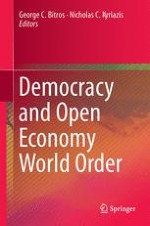2017 | OriginalPaper | Chapter
11. Political Economy Perspectives of the Fall of the Greek Monarchy
Author : George Tridimas
Published in: Democracy and an Open-Economy World Order
Publisher: Springer International Publishing
Activate our intelligent search to find suitable subject content or patents.
Select sections of text to find matching patents with Artificial Intelligence. powered by
Select sections of text to find additional relevant content using AI-assisted search. powered by
